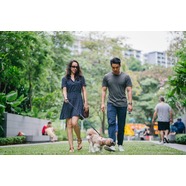Socialising your new puppy

Socialisation is the process of developing relationships with other living beings, people and animals. Puppies have a 'critical socialisation period' between the ages of approximately 3 -17 weeks of age. At this time sociability outweighs fear and time for adapting to new people, places, animals and experiences is easiest.
The puppy's experiences during this critical period of learning and development can influence and shape their behaviour well into adulthood. Providing your puppy with plenty of opportunities to socialise during this time will help ensure you raise a dog that grows into a confident, well-adjusted and friendly adult dog.
Our puppies can become comfortable and confident in any situation, with all types of people and with any stimuli that comes their way if a thorough and proactive socialisation regime is carried out.
We must get this work done with our young puppies because after the four-month mark has passed it is no longer easy for the puppy to absorb anything that he may encounter or to accept anyone that he meets.
This is not an idea but rather a scientifically proven theory that has been extensively researched, studied, and known about since the 1930’s. It is important information for anyone raising and or training a puppy.
A dog that has not been socialised becomes the epicentre in a storm of problems. Dogs get sick from stress. This can inhibit your ability to train them; they can shed excessively, and develop health problems. Stressed out dogs can get aggressive, unpredictable and unmanageable. Children are bitten in huge numbers. People give up and the dog ends up in an animal shelter.
Can you live comfortably with a dog that bites (children, other dogs and adults)? How embarrassing might it be if you dog growls, lunges at, or even barks at someone from a different ethnic background? Can you tolerate your dog chasing or attacking someone in a wheelchair or a walker? How would you feel if your dog bit or injured another dog?
How can I socialise my puppy?
Socialising your puppy should be done in a fun, safe and controlled environment.
- Enrolling your puppy in a puppy school means that your puppy with socialise with other vaccinated pups and learn about puppy play, canine body language and also how to be calm around other dogs. Puppy School needs to be undertaken by an experienced trainer who will ensure puppy play is done in a controlled and safe way. If the play is just a ‘free for all’ this is definitely an alarm bell for you to chose another puppy school as in this critical socialisation time when we want all experiences to be positive. If a puppy has a terrible or scary experience early on it can be detrimental. Puppy school provides you with a wealth of information and novel experiences for your puppy (and you!). Ask lots of questions! Look for a Delta Certified Puppy trainer who has done specific training in this area.
- Invite friends and family over to your house to watch TV, have dinner or just hang out. As your guests come in, lure your puppy into a sit with a treat. Have all of your guests give a treat to the puppy as well.
- Make sure you visit the vet with your pup just for fun. There will be times when your dog will need to go the vet for not so fun times, but if you have regularly visited the vet just for a simple treat and pat, it won’t be such a scary or stressful place.
- Most puppies are portable enough that at a young age you can take them out and about with you to pet shops and the wide world. Remember to avoid dog parks and placing your puppy or any unknown areas as Canine Parvovirus can remain active in the ground for up to 12 months.
- Turn each opportunity of meeting someone or something new into a positive experience with treats and toys and fun.
- Each person that your puppy meets should give the pup a treat (supplied by you). This is thorough socialisation. It is not enough for the pup to have a sniff of a person. You should set up a positive experience for the pup while meeting all types of people.
- Seek out strange sights, sounds, and situations specifically to expose your puppy to them and have him get familiar and comfortable with them.
- Teach your puppy to enjoy being handled and gently restrained – this is especially important for pups that will need to visit a groomer as they grow and for general check-ups at the vet.
- Allow your puppy the opportunity to experience walking on different surfaces.
- Dogs know the world first and foremost through their sense of smell. Their sense of smell and hearing is far more acute than ours. Prepare your pup for life’s loud noises and odd smells. Play the stereo and TV loud! Classical music is a good choice to accustom your dog to large bangs and booms!
- It is important that socialisation is done in a fun and positive way. If at any time your puppy is frightened, do not push them into any situation they may be uncomfortable with. Simply start from a point where your puppy is relaxed and build up their confidence. Your ultimate goal is for your puppy to be comfortable and confident around stimuli that was previously scary to him.
- Continued positive exposure to new people and environments will ensure your puppy continues to develop and maintain good social skills.
- A ‘socialisation schedule’ is a good idea to post on your fridge or wall to keep track of their progress and ensure you are on track to raising a puppy that will grow up to be a joy to be around.









